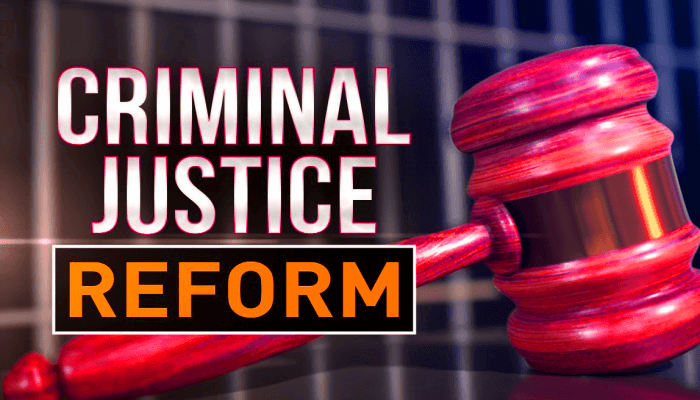Criminal Law Reform: Strategies for a Fair and Just Society

Criminal law reform is a multifaceted endeavor aimed at creating a legal framework that promotes fairness, equity, and justice within society. It encompasses a wide range of initiatives and policies designed to address systemic flaws and inequities within the criminal justice system. By analyzing current challenges and proposing comprehensive strategies for reform, we can work towards building a more inclusive and effective legal system.
Understanding the Need for Reform
The need for criminal law reform is rooted in the recognition of significant shortcomings within the existing legal framework. Across the globe, there is growing awareness of systemic biases, racial disparities, and socioeconomic inequalities that pervade the criminal justice system. These issues manifest in various forms, including disproportionate arrest and incarceration rates for marginalized communities, harsh sentencing practices, and the criminalization of poverty.
Key Strategies for Reform
Legislative Changes
Legislative reforms are essential for addressing systemic issues within the criminal justice system. This includes revisiting sentencing guidelines to ensure proportionality and fairness in punishment. For example, mandatory minimum sentences, which have been criticized for their inflexibility and contribution to mass incarceration, may be reformed to allow for more discretion in sentencing judges. Additionally, proposals for decriminalizing certain offenses, such as drug possession for personal use, can help reduce the burden on the criminal justice system and redirect resources toward prevention and treatment efforts.
Restorative Justice Programs
Restorative justice offers an alternative approach to traditional punitive measures by focusing on repairing harm and restoring relationships between offenders, victims, and the community. This process emphasizes accountability, empathy, and rehabilitation, rather than punishment. Restorative justice programs typically involve facilitated dialogues between the parties involved, where the offender takes responsibility for their actions and works towards making amends to the victim and the community. Research has shown that restorative justice programs can lead to higher levels of victim satisfaction, reduced recidivism rates, and overall improved outcomes for all parties involved.
Community Policing Efforts
Community policing initiatives are aimed at building trust and collaboration between law enforcement agencies and the communities they serve. This involves fostering positive relationships through regular engagement, open communication, and collaborative problem-solving. Community policing strategies prioritize proactive crime prevention efforts, such as addressing underlying social issues like poverty, homelessness, and substance abuse, rather than solely relying on reactive law enforcement measures. By working together with community members, law enforcement agencies can gain valuable insights into local concerns and develop tailored responses that prioritize community safety and well-being.
Challenges and Roadblocks
Despite the importance of criminal law reform, some numerous challenges and roadblocks must be addressed. Resistance from traditionalists within the criminal justice system, including prosecutors, judges, and law enforcement officials, can hinder progress toward meaningful reform. Additionally, funding constraints and political opposition may pose significant barriers to implementing comprehensive reform initiatives. Moreover, there is often resistance from segments of society that benefit from the status quo, such as private prison operators and industries that profit from mass incarceration.
Read More: Criminal Law and Justice: Perspectives on Enforcement and Punishment
Public Perception and Education
Public perception and education play a crucial role in advancing criminal law reform efforts. Raising awareness about the flaws within the current system and engaging communities in dialogue are essential steps toward effecting change. By addressing misconceptions and fostering a deeper understanding of the issues at hand, individuals can become advocates for reform and contribute to building a more just society. Additionally, educating policymakers and other stakeholders about evidence-based practices and successful reform efforts can help garner support for meaningful change.
International Perspectives
International perspectives on criminal justice reform can provide valuable insights and lessons for policymakers seeking to address systemic issues within their jurisdictions. By examining successful reform efforts in other countries, policymakers can learn from innovative approaches and adapt them to their contexts. Comparative analysis of criminal justice systems can also highlight areas of strength and weakness, guiding efforts to implement effective reform initiatives.
Case Studies
Case studies of jurisdictions with successful criminal law reform initiatives offer valuable insights into the impact of various strategies. For example, diversion programs for non-violent offenders, such as drug courts and mental health courts, have been shown to reduce recidivism rates and alleviate pressure on the criminal justice system. Similarly, community-based alternatives to incarceration, such as restorative justice programs and youth mentoring programs, have demonstrated positive outcomes in terms of rehabilitation and reintegration.
Measuring Success
Measuring the success of criminal law reform efforts requires the development of comprehensive metrics to evaluate effectiveness. This includes tracking changes in crime rates, recidivism rates, and disparities within the justice system. By collecting and analyzing data over time, policymakers can assess the impact of reform efforts and make informed decisions about future directions. Additionally, qualitative measures, such as victim satisfaction and community perceptions of safety and trust in law enforcement, are also important indicators of success.
Future Directions
Looking ahead, the need for continued advocacy for criminal law reform remains paramount. As societal norms and values evolve, so too must our approach to justice. By staying informed about emerging trends in criminal law and justice, stakeholders can anticipate challenges and opportunities for reform. Continued collaboration between policymakers, practitioners, advocates, and community members is essential for driving meaningful change and building a fair and just society for all.
Read More: Crimes and Punishments: Exploring the Dynamics of Criminal Law
Conclusion
In conclusion, criminal law reform is essential for creating a fair and just society. By implementing legislative changes, restorative justice programs, and community policing efforts, we can address systemic issues within the criminal justice system and create more equitable outcomes. Despite challenges and roadblocks, continued advocacy and public engagement are crucial for advancing reform efforts.
FAQs(Criminal Law Reform: Strategies for a Fair and Just Society)
What are some common misconceptions about criminal law reform?
Criminal law reform is often misunderstood as being solely about leniency towards offenders. In reality, it is about creating a more effective and equitable system that prioritizes rehabilitation and community safety.
How can individuals contribute to the reform process?
Individuals can contribute to the reform process by educating themselves about the issues, participating in advocacy efforts, and supporting organizations working towards change.
What role does technology play in modernizing the criminal justice system?
Technology can play a significant role in modernizing the criminal justice system by improving data collection and analysis, enhancing communication between stakeholders, and increasing transparency and accountability.
Are there any potential drawbacks to restorative justice programs?
While restorative justice programs have many benefits, some critics argue that they may not be suitable for all cases, particularly those involving serious offenses or repeat offenders. Additionally, there may be challenges in ensuring the voluntary participation of all parties involved.
How can policymakers balance the need for accountability with the goal of rehabilitation?
Policymakers can balance the need for accountability with the goal of rehabilitation by implementing evidence-based practices that prioritize both public safety and the well-being of offenders. This may involve tailoring sentencing options to individual circumstances and providing access to supportive services.











